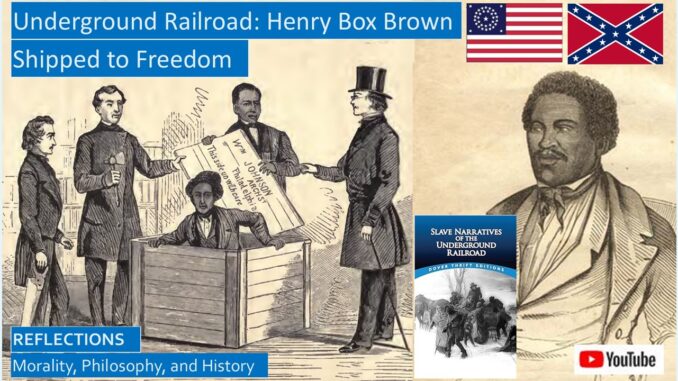
How did Henry Box Brown escape from slavery? Simple, in 1849 he “had himself boxed up and forwarded to Philadelphia direct by express.” The box was “made to fit him most comfortably,” it was “two feet eight inches deep, two feet wide, and three feet long.” With him were “one bladder of water and a few small biscuits,” with but one hole for breathing.
After he “entered his box, it was safely nailed up and hooped with five hickory hoops and was addressed” by a friend to William Johnson in Philadelphia marked, “This side up with care.” The box was transported mostly right side up, but for many miles it was transported upside down, which “had him on his head for miles.” This box went from steamboat to wagon to railroad, the delivery time was a little more than a day.
YouTube video for this blog: https://youtu.be/q3AWLDo4e6I
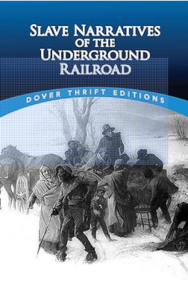 Would the human cargo be shipped alive? The package did not arrive quite on time, but it was decided that officials of the Anti-Slavery office would go down to the depot to pick it up when it arrived. Would this be a resurrection event, like Lazarus, when this ex-slave stepped out of the box?
Would the human cargo be shipped alive? The package did not arrive quite on time, but it was decided that officials of the Anti-Slavery office would go down to the depot to pick it up when it arrived. Would this be a resurrection event, like Lazarus, when this ex-slave stepped out of the box?
The box had been brought safely inside the office. “All was quiet. The door had been safely locked. The proceedings commenced. Mr McKim rapped quietly on the lid of the box and called out, “All right!” Instantly the answer came from within, “All right, sir!”
“The witnesses will never forget that moment. Saw and hatchet quickly had the five hickory hoops cut and the lid pried off, and the marvelous resurrection of Brown ensued. ‘How do you do, gentlemen?’” Henry Box Brown “was about as wet as if he had come up out of the Delaware.” “He remarked that” “he had selected for his arrival-hymn, if he lived, the Psalm beginning with these words: “I waited patiently for the Lord, and He heard my prayer.” “Most touchingly did he sing this Psalm.” “He was then christened Henry Box Brown.”
With this success, these abolitionists tried to free two other slaves with this same method. But Frederick Douglass complained that Henry Box Brown should not have been so quick to publicize exactly how he had escaped from slavery, which closed this avenue of escape. Indeed, when “these two boxes containing these young men were,” by “telegraph, betrayed, and the heroic young fugitives were captured in their boxes and dragged back to hopeless bondage.” Samuel Brown, who had boxed these three slaves to deliver them to freedom was arrested, convicted, and served eight years in prison for this crime at the time. After all, he had deprived their slave masters of their valuable property, and before the Civil War, slaves were as valuable then as automobiles are today.
Why did Henry Box Brown decide to escape slavery? Initially, his life was more tolerable than most slaves, his master leased his services to a tobacco factory, and he rented a house where he lived with his wife and three children. But though his master promised he would not split up his family, his master sold his pregnant wife, further splitting up his family by selling his three children to yet a different master.
Henry Box Brown was a notable abolitionist speaker in the North, but after the passage of the Fugitive Slave Act in 1850, he emigrated to England, not returning until 1875, just as Frederick Douglass did, condemning slavery and supporting himself as a magician and entertainer.[1]
Life and Times of Frederick Douglass, After Slavery as an Abolitionist
http://www.seekingvirtueandwisdom.com/life-and-times-of-frederick-douglass-after-slavery-as-an-abolitionist/
https://youtu.be/M0sx85oMRQA
DISCUSSING THE SOURCES
We will be reviewing many of the stories about slaves escaping to freedom in the Underground Railroad, and there are other slave narratives. Frederick Douglass escaped from slavery when the abolition movement began. Augustine Tolton and his mother escaped from slavery during the Civil War, he was the first black priest ordained after the Civil War. And Booker T Washington was emancipated as a young teenager at the end of the Civil War.
Frederick Douglass Tells Us About His Life as a Slave in his Autobiography
http://www.seekingvirtueandwisdom.com/frederick-douglass-tells-us-about-his-life-as-a-slave-in-his-autobiography/
https://youtu.be/7VkzhyNnuQk
Life and Times of Frederick Douglass, After Slavery as an Abolitionist
http://www.seekingvirtueandwisdom.com/life-and-times-of-frederick-douglass-after-slavery-as-an-abolitionist/
https://youtu.be/M0sx85oMRQA
Father Augustine Tolton, From Slave to Priest
http://www.seekingvirtueandwisdom.com/father-augustine-tolton-from-slave-to-priest/
https://youtu.be/dZbzWJkAf5k
Up From Slavery: Autobiography of Booker T Washington
http://www.seekingvirtueandwisdom.com/up-from-slavery-autobiography-of-booker-t-washington/
https://youtu.be/yxDnJ6sBoJc
In our first video in this series, Harriet Jacobs sailed for freedom after hiding for many years on her plantation.
Underground Railroad: Harriet Jacobs, the Slave Girl Who Escapes Slavery Before the Civil War
https://seekingvirtueandwisdom.com/underground-railroad-harriet-jacobs-the-slave-girl-who-escapes-slavery-before-the-civil-war/
https://youtu.be/3KMkAyg7goY
We read of Eliza Harris who escaped with her infant daughter crawling from one block of ice to another, crossing a river not quite frozen over in the winter, with slave catchers watching helplessly on the bank. This incident inspired a scene in Harriet Beecher Stowe’s Uncle Tom’s Cabin, a novel that helped spark the Civil War.
Underground Railroad: Eliza and Her Infant Escape Slavery Over the Ice Before the Civil War
https://seekingvirtueandwisdom.com/eliza-harris-and-her-infant-escapes-slavery-over-the-ice/
https://youtu.be/kRSzNZP73og
Harriet Tubman was perhaps the most famous conductor on the Underground Railroad, she returned to Maryland nineteen times to lead family members and other slaves to freedom, and even assisted in a military raid in South Carolina during the Civil War.
Harriet Tubman, Conductor of Underground Railroad, Leading Many Slaves to Freedom
https://seekingvirtueandwisdom.com/harriet-tubman-conductor-of-underground-railroad-leading-many-slaves-to-freedom/
https://youtu.be/Lkk30_zIDI0
We reflect on the horrific story of Margaret Garner, who sacrificed her daughter’s life rather than subject her to a lifetime of sexual abuse and slavery, who was the inspiration for the book Beloved.
[1] William Still, Henry Box Brown, Arrived by Adam’s Express, included in Slave Narratives of the Underground Railroad (Garden City, New York, Dover Publications, 2001, 1872), pp. 1-6, and https://en.wikipedia.org/wiki/Henry_Box_Brown

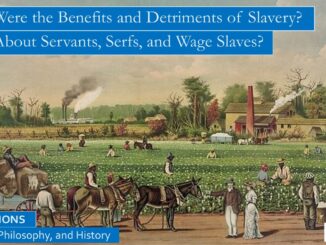
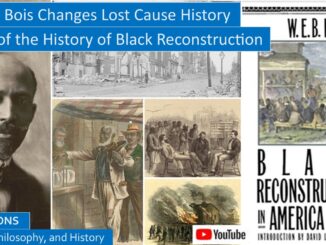
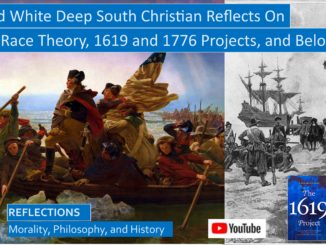
Be the first to comment